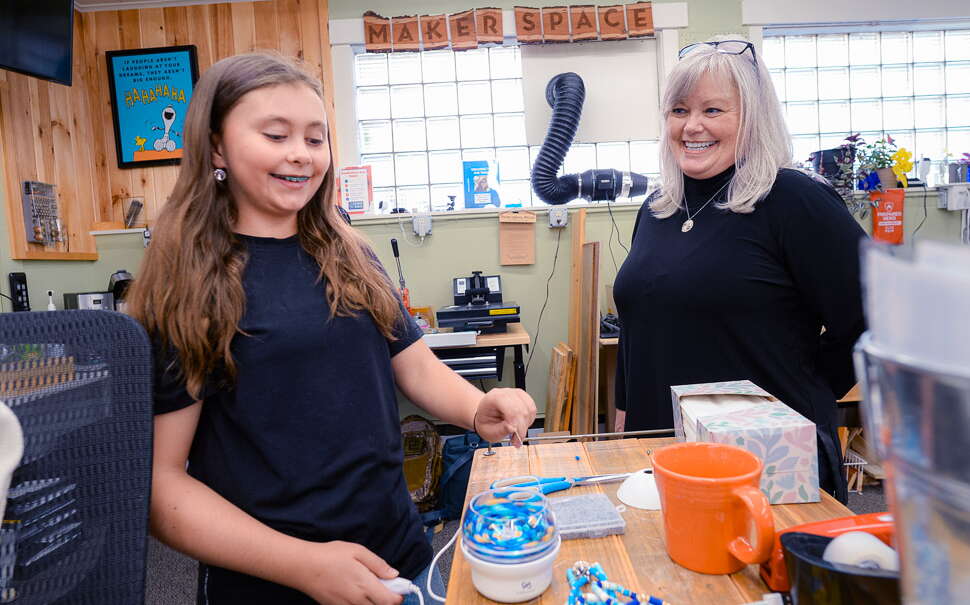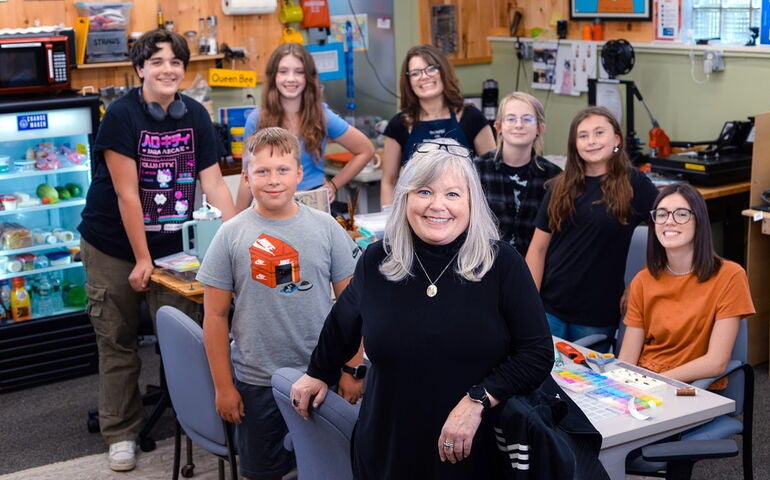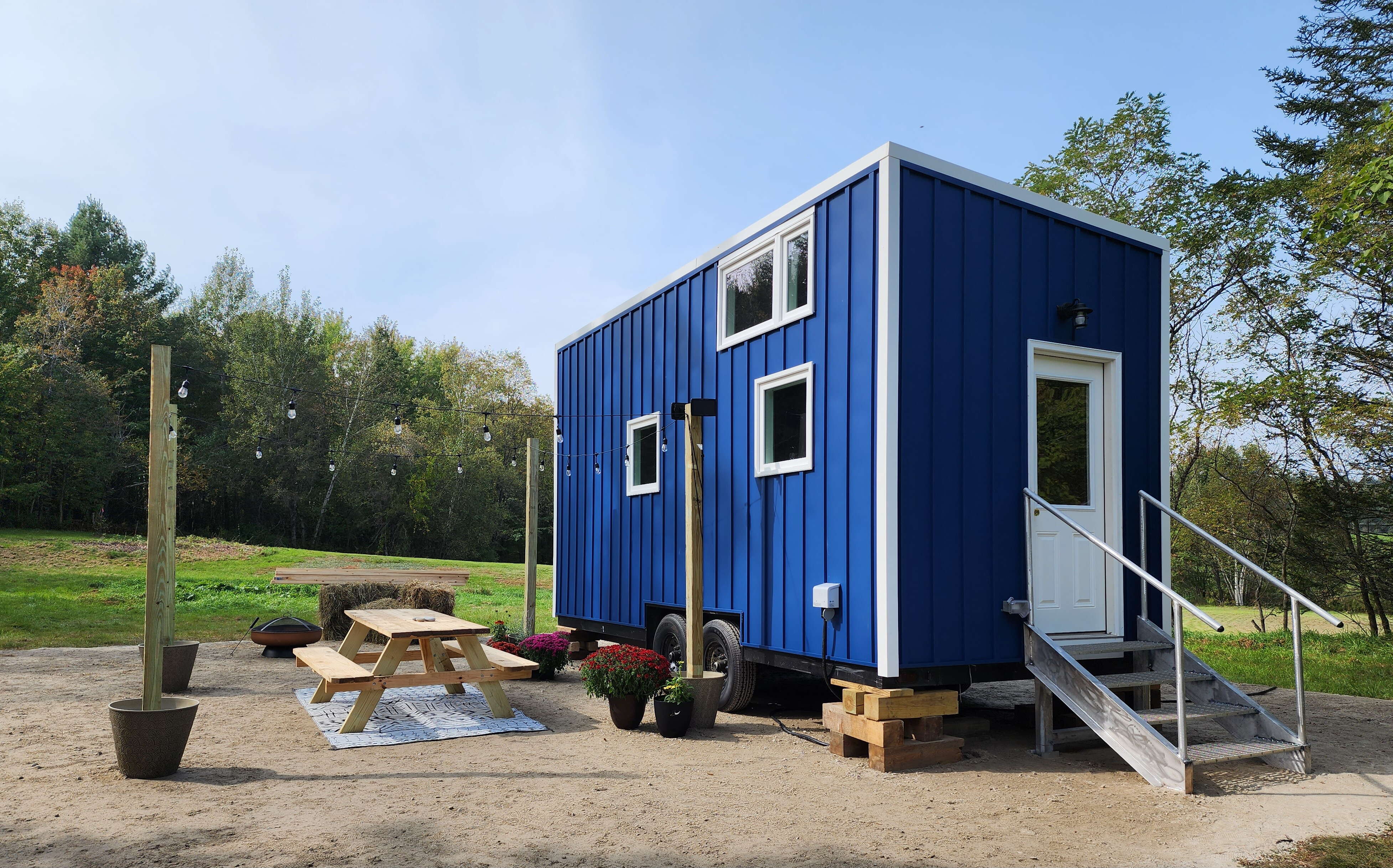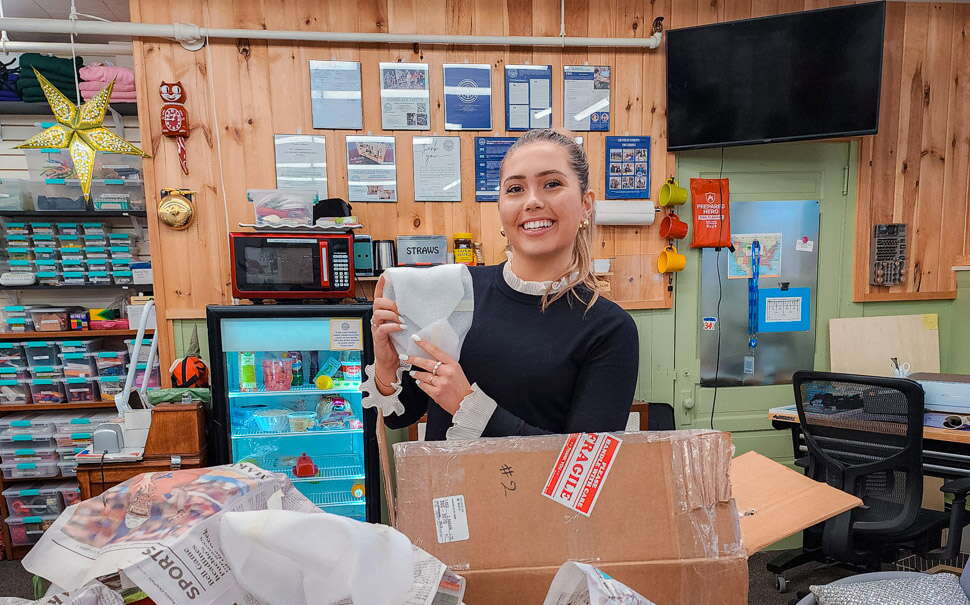
A Farmington program for youth-run startups plans campus expansion
 Photo / Fred Field
Founder Bonita Tompkins with participants at the Center for Entrepreneurial Studies in Farmington. Clockwise from left: Declan Ferriter, Wyatt Fuller, Layla DeCastro, Alicia Phillips, PJ Hutchins, Rosie King and Jade Taylor.
Photo / Fred Field
Founder Bonita Tompkins with participants at the Center for Entrepreneurial Studies in Farmington. Clockwise from left: Declan Ferriter, Wyatt Fuller, Layla DeCastro, Alicia Phillips, PJ Hutchins, Rosie King and Jade Taylor.
In downtown Farmington, a group of youth is busy running a gift shop full of bright, colorful items. But they’re not just clerks hired to run the cash register and stock shelves.
At the nonprofit Center for Entrepreneurial Studies, they’re hired as interns to learn business, communication and customer service skills, such as end-of-day reporting, selecting product lines, issuing purchase orders and placing orders with manufacturers and sales representatives.
The store includes a connected maker space, where youth can design and produce their own goods and services in an environment of entrepreneurial education and support in areas like marketing, finance, legal and specialty skills.
“CES emphasizes entrepreneurship because it’s important for youth to understand what it takes to operate a business,” says Bonita Tompkins, the center’s founder and executive director.
“While some may realize they aren’t ready to become entrepreneurs right away, the experience provides them with valuable skills and a deeper appreciation for the demands of running a business.”
She adds, “This foundational knowledge could lead them to start their own businesses later in life, as it did for me in my career.”
Store and maker space
Tompkins is a former teacher, with a focus on business and entrepreneurship, at Mt. Blue High School in Farmington.
In 2018, Tompkins and some of her students piloted a project to assist students with accessing internships and entrepreneurial opportunities.
The group developed the idea by incorporating CES as a nonprofit entrepreneurial studies program for youth and young adults, who are called “Changemakers.”
CES has seven employees, including Tompkins, and works with youth age 10 to 24. Young people largely become involved through word-of-mouth.
At any given time, there are on average 15 participants, with 98 in all since 2020, when CES opened the 3,000-square-foot storefront and maker space at 156 Main St. for youth to create and sell goods and develop workforce skills.

The maker space has tools such as computers, printers, hand tools, a laser printer, a 3D printer and a “smart” cutting machine for participants to make gift items. Students have access to bar-coding equipment to make stock keeping units, or SKUs, for their products and worksheets to complete purchase orders when they enter inventory into the point-of-sale system.
Tiny house
The center then collaborated with Manchester-based Kennebec Cabin Co. — which produces the renovation reality TV show “Maine Cabin Masters” — to build a tiny home in a building shell provided by OpBox, a Woolwich maker of modular structures. More than two dozen additional businesses contributed to the project. Called “Making Home Possible,” it resulted in Maine’s first tiny home on wheels for homeless youth.
The project was featured on Season 10, Episode 13 of “Maine Cabin Masters.” Making Home Possible’s broader mission is to tackle the lack of affordable housing and the lack of a homeless shelter or youth center in Franklin County; and to provide internships, mentoring and work opportunities.
“It was an easy cause to get involved with,” says Chase Morrill, co-founder of Kennebec Cabin and a “Maine Cabin Masters” star.
Morrill recalls his team’s introduction to CES at a local parade.
“They had a trailer frame ready to go and wanted to show the community,” he says.
It was a cold, drizzly November day. But Morrill recalls smiling faces: “Everyone had their earmuffs on, displaying positive vibes and big smiles proudly showing off the new trailer frame that would eventually become the first tiny home.”

Afterward, the cabin masters checked out CES’s store and the students’ craftsmanship.
“The opportunity for learning, hands-on real-life skills, and being a contributing member of the community is key to helping Maine’s younger generation thrive and build a successful life in this great state,” Morrill says.
Campus plans
In 2022, CES acquired an owner-financed, six-acre campus at 165 Whittier Road in Farmington to design a campus that builds on initial successes by expanding into agriculture, culinary education and home manufacturing.
The campus is just under a mile from the local high school.
“This will provide easy access for students to work and be paid in roles that align with their interests and strengths, accommodating their school schedules,” says Tompkins.
This year, the center received the donation of another five acres on Temple Road in Farmington from a local businessman, Michael Emmons.
The vision for the locations is to serve as the primary sites for providing internships and entrepreneurial opportunities for youth in Franklin County.
At Whittier Road, with the help of volunteers, initial installations include a fire pit and patio, a perennial garden, raised garden beds, prepared land and the tiny home. Planning is in the works to build facilities for a commercial test kitchen and café, a garden center and greenhouses, and retail operations; for manufacturing and technology; and for ancillary spaces such as participant housing, events and training.
That includes creating multiple accessible paid internships where youth can develop skills and build the workforce and business economy.
“We aim to expand our internships by pairing youth with mentors, employers, senior peers and educational opportunities,” Tompkins says.
She continues, “Many employers in Franklin County don’t have formal traditional internship programs that yield solid results due to challenges such as transportation, school schedules and liability. This gap is one of the key reasons we created CES.”
Development costs and financing going forward are still being determined. Tompkins says she’s seeking financing through business revenue, philanthropy, government grants and foundations.
“We hope to break ground in mid- to late 2025,” says Tompkins.
At Temple Street, a goal is to assist youth and young adults by providing stable affordable housing.
Youth planners
A key aspect of the program is the participation of CES youth in the planning process.
“Part of the organization’s goal is that the planning process is not happening in a silo away from the kids in the program,” says Nicole Beach. “The kids are involved.”
She became involved with CES through her high-school-age son Tyler and his buddy José Gutierrez, who wanted to start a business selling a type of crystal they were making from a metal called bismuth.
“If you control the temperature as it cools, you can get a rainbow effect,” says Beach. “He said, ‘If I buy it in bulk, I can melt it and create crystals.’”

He took samples to the CES gift shop and emerged after talking with Tompkins.
“I pick him up and he’s grinning and carrying a toaster,” says Beach. “He had a piece of paper with questions about starting a business — ‘What’s your market? Who is your customer?’ He said, ‘They helped us with the company name and logo, they’re going to make business cards for us, here’s the agreement, the store gets a small profit, they’ll cut us a check when the product sells. We can volunteer in the store.’ I thought, ‘This is really cool.’”
The young partners went on to contact other retailers and wholesalers and now have additional partners.
“All of a sudden, he was so empowered and excited about doing this business, getting online, using e-commerce,” Beach says. “I was floored. I had tried for three years to talk with him about it.”
The toaster? Tyler had mentioned to Tompkins it was a way to cool the metal more slowly.
“And Bonita said, ‘Hey, we have a toaster. Here you go!’” Beach says.
Beach has a background in marketing and public relations, formerly working with companies like Farmington-based manufacturer Origin and its sister-company, Jocko Fuel, and now as a consultant. She offered to help CES. Leading a strategy session earlier this year, she recalls the youth who participated were just as serious and involved as any executive in a boardroom.
“One of them said, ‘I feel like the key is for participants to finally believe that they can take control and create a better life,’” she says. “That was so profound and it became a key takeaway — and it came from one of the youth participants.”
Deep dive
The retail storefront, makerspace and tiny house offer great visibility for CES, says Amanda Coolong, who joined the CES board of directors earlier this summer.
“Now it’s, ‘How do we start showing our community and broader world what we’re up to?’”
Coolong brings experience from her work with incubators and accelerator programs in California. She grew up in Franklin County and her family has been there for generations. Growing up, local mills were closing, young people’s work options were limited and they were encouraged to leave home.
“A lot of us were told that, in order to be something, you had to leave and get a degree,” Coolong recalls. “It breaks my heart to think about that, and a lot of us did leave.”
After college in Boston, Coolong worked at tech PR firms, then headed to Los Angeles, where she stayed 20 years working in innovation and technology, including with early-stage startups, then co-founded a media company that championed the startup ecosystem that was thriving in the City of Angels.
In 2020, she returned to Franklin County.
“When I got here, I was floored by what I was seeing,” she says. “I was witnessing and feeling the exact same things in Franklin County that I did at a much larger scale in Los Angeles.”
That was a growing community of startups and initial programs to support them.
One of them was CES, which quickly attracted Coolong’s attention.
“When I first came back, I started to do some research to see what’s out there,” she said. “Bonita’s name popped up everywhere.”
Coolong offered her expertise. Now the board is taking a deep dive into CES’s mission, vision and values, while planning, fundraising and identifying partners.
“Right now we’re in the early phases of structuring our focus around three key pillars at CES: life skills and leadership, business education and social enterprise,” Coolong says. “ We’ve shown proof of concept with our Changemakers launching micro businesses where they’re learning everything from branding and marketing to pricing, inventory and sales. We’ve been tracking their outcomes, and they’re thriving.”
Now the board is firing on all cylinders to get shovels in the ground at the Whittier Road site.
“We have wonderful community support already,” Coolong says. “It’s definitely coming together and we’re seeing momentum.”














0 Comments